Lively debates and new products at 2024 Fair
3rd July 2024
The return of the British Pig and Poultry Fair brought a lively and enthusiastic cohort of exhibitors, farmers, breeders and innovators together. Sarah Juggins reports.

While the atmosphere around the NEC’s vast complex was convivial, much of the messaging was sombre: endemic diseases, unbalanced supply chains and challenging labour shortages have hit both sectors hard.
However, there were some brighter news bites. Defra’s Janet Hughes spoke of the ongoing roll-out of SFI standards and urged farmers who had discounted these in the early days to “look again”, as there had been many adaptions and additions.
Opening the show, farm minister Sir Mark Spencer reiterated the huge challenges facing both the pig and poultry sectors, including: the ongoing war in Ukraine; the ever-present threat of avian flu and the hovering shadow of African swine fever; as well as contending with a consumer base that has enjoyed cheap food for many decades.
Following the Farm to Fork summit hosted by prime minister Rishi Sunak the previous day, Sir Spencer was able to highlight grants that the government had promised the farming sector. Of the promised £427m he said a significant amount would go towards supporting animal health and welfare in both the poultry and pig sectors.
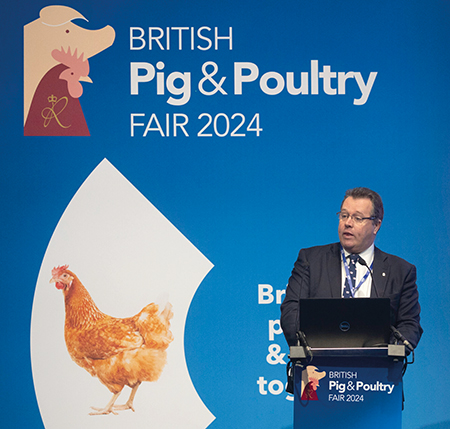
Sir Spencer also spoke with the passion of someone with a farming background when he reiterated the importance of food security, underpinned by a resilient farm sector.
“As the prime minister has made clear, food security is vital to national security.”
Much of the speech outlined reviews and strategies that will lead to change in the future – such as new broiler regulations, reviews of the supply chain, the creation of international agri-food attaches and unlocking new export markets – but, while Sir Spencer’s passion for the sector was clear, there was also a sense that this was the last throw of the dice and many of the planned reviews and new regulations will be up for discussion by the end of the year.
Pathway to pig health and welfare
Stewart Houston, chair of the Pig Pathway and Welfare Pathway Group introduced the session focusing on Animal Health and Welfare Pathway for the pig sector.
He explained that the Animal Health Review will include testing for PRRS, two to three hours of vet advice and – to a hum of approval from the audience – a simple reporting process with no tick boxes.
Chris Maxwell of Defra added: “The PM has announced initiatives to fund the Endemic Disease Programme, which includes the eradication of PRRS. £72 million pounds will be available of which £20 million will be poultry grants to improve infrastructure for laying hens.”
The increased funding will also enable more in-depth investigation into the planned PRRS testing.
Gemma Thwaites, of the Garth Pig Veterinary Practice said: “There will be a change from blood to oral fluids in the testing process as it is a lot less stressful for the pigs.
“That is in the pipeline. The announcement of the extra funding means that there will be a chance to do more investigations with additional depth and rigour.”
Cleaner air for chickens
Dr Gina Caplan of Defra explained that the priorities for the AHW Poultry Pathway is focused on welfare conditions, such as space, ventilation and stocking rates.
The capital grants available include infrastructure grants for new housing or upgrades, while smaller grants enable farmers to purchase equipment and technology.
READ MORE: New funding for hen housing to launch soon
The eligibility checker for larger grants opened after the Fair, in June. The full application process opens in late 2024 and the grant funding agreements begin from that point on until June 2026.
The Animal Health and Welfare Small Grants are part of the FETF, ranging from £1,000–25,000 and make up 50% of the total cost.
African swine fever: Preparing for the worst
Gemma Thwaites of Garth Pig Practice is not one to exaggerate so when she says ASF is a hot topic and one we should be very worried about then, as a sector, we should be listening.
Mandy Nevel, AHDB, put it plainly: “The disease is heading our way but there are things we can do reduce the risk.”
Nevel advises that pig farmers keep their movement records completely up to date and easily accessible. This will enable any investigation into the source of the disease to be carried out as quickly as possible.
The need for speed is apparent. Nevel explained that the immediate area around any identified site of ASF would become a protection zone, with a wider surveillance zone circling it.
Movement restrictions within these zones would be stringent and she advised farmers to become familiar with any movement restrictions and to make contingency plans.
With some restrictions of at least 40 days following a cull and cleanse on an infected farm, neighbouring pig owners will need to ensure they have measures in place to cope with at least 40 days of not being able to move any animals or food/waste products on and off site.
The knock-on effect will also impact neighbouring businesses. If, for example, there is a farm shop or an Air BnB nearby, they will also have restrictions imposed.
Businesses that use farm premises as a base will also suffer restrictions.
In the face of a worst case scenario Lizzie Wilson, CEO National Pig Association (NPA), offered some guidelines:
- Ensuring staff know how to identify ASF and what to do if a case is suspected
- Keep all farm movement records clear, easily accessible and, if possible, digital
- Sit down and make a contingency plan for what you will do in the event of a notifiable disease outbreak.
“Biosecurity is your first line of defence,” said Ms Wilson. “Please don’t think an outbreak is inevitable, good biosecurity will keep the disease under control.”
Deep dive into egg production costings
James Baxter, BFREPA chairman, took a look back at the past two years, reminding the audience how egg prices had dropped so far that production fell and shelves were left empty.
As a result, a team from ADAS, led by Jason Gittens, has been doing a deep dive into the cost of production figures in free-range and organic egg producing systems.
Mr Gittens said the four major costs were feed, pullet costs, labour and capital costs. Frequent and carefully curated figures, gleaned from numerous sources, were compiled to keep costings updated on a monthly basis.
Mr Baxter said: “We gathered a roomful of experts and we have a set of very accurate costings and they have been a tremendous asset to us as farmers because we can see whether, where or how we can make a profit.”
As well as seminars, the Fair also saw a vast range of exhibitors showcasing their products and services, and new launches…
Product relaunch uses all the ‘best bits’

Farm Fluid Max is a relaunch of the previously highly successful Farm Fluid coccidiosis control product. The disinfectant takes the best bits of chemistry from the early iteration of the product but formulates the end product with care and consideration for its environmental impact.
Jonathan Thomas-Nash, product manager at Neogen, says the relaunched product offers efficacy against multiple Eimeria oocysts.
Farm Fluid Max has been in development for the past two years. “We had a benchmark but the past two years have been a case of exploring how we combine the chemistry to achieve the benchmark while caring for the environment,” said Mr Thomas-Nash.
Neogen has also added IDAL intradermal vaccinations to its range. Mr Thomas-Nash says this will add high quality syringes, drenches and vaccinators to Neogen’s farm and veterinary offering. “We are offering a syringe where we have a full range of replacement parts readily available so it really could be the last syringe you ever buy.”
Adaptability and simplicity

Spread-a-bale is the brainchild of managing director Michael Hughes.
The machine, which comes in a range of sizes, allows livestock farmers to distribute straw easily, efficiently and much more quickly than traditional methods.
It can spread both round and rectangular bales; can be connected to a tractor or teleporter from the front or side giving added manoeuvrability; the straw can also be discharged from the front or either side; it distributes straw at the length it was cut, thereby avoiding dust and chaff; and can unload a bale within a minute.
“I was a dairy farmer,” says Mr Hughes, “So I knew what would work for me. Plus this has been designed after a lot of discussion with farmers. This cuts labour and reduces wastage.”
Farmers doing it for themselves
When a piece of equipment has been built, tried and tested by the farmers actually using it, you know it is likely to work.
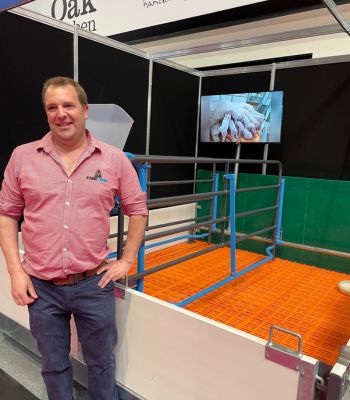
Father and son team John and Matthew Wilkin wanted to find a better farrowing system than was currently on the market so they set about building their own.
The Farropen system was the result of 60 years of combined knowledge and, although John says that the idea and execution was all down to Matthew, you just know that this was a real team effort.
The Farropen is simple to use, hugely versatile and has sow and piglet welfare at its heart. The ability to set different sizes and different angles to the pens is also key for worker safety.
The results are there for all to see: piglet mortality is consistently below 12%; sow feed and water intake has risen; weaning weight and viability of piglets has significantly increased.
The Farropen has a range of settings which allows it to be installed in awkward spaces or moved from one area to another.
There are also access gates on both sides of the pen, allowing staff to work easily around the pen.
A 360 approach to pig health
LeeO Farm Precision is the final part of the jigsaw completing MSD’s 360 approach to animal health. It is a cloud-based tracking and monitoring system and app that brings together all the information about herd health at individual animal level.
Using EID tags and readers, farmers are able to collect the data for sows and piglets from birth onwards. LeeO will enable better decision-making at farm level and improve traceability and high welfare production through the supply chain.
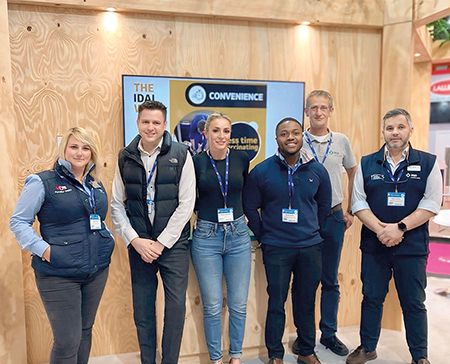
Ingrid Potter, key account manager at MSD Animal Health UK says: “There is plenty of data in the pig sector but it is very difficult to be clear about what the data is showing. With LeeO you can integrate and connect data to gain deeper understanding of variation at an individual pig level.
“We find farmers collect plenty of data but they are not getting the most from it. We need to move past the paper and pad stage. People are looking for fast, accurate and simple data collection, recording and analysis that has a real, beneficial outcome.”
In addition to LeeO, MSD is also showcasing its Porcilis Health Management vaccination programme, IDAL needle-free technology and a back-up support team of vets and account managers.
Big Dutchman takes centre stage

“This has been a long time in the planning but we are really excited to be here showcasing the products.” This was Anna McMahon of Newquip talking about the company’s stand at the show, which dominated the middle of Hall 11.
On display was the impressive Big Dutchman range of pig and poultry equipment which serves to create a natural and optimal environment for animals.
Ventilation, self-serve feed, easy access to the nest and breeding areas and easy to clean surfaces make the Big Dutchman kit a vital player in the drive to create a healthy living environment for livestock.
Holding its own under the scrutiny of visitors was the Big Dutchman Pig Toilet, which is a concept study being developed by experts from Germany. Also on display was the Earny Heat Exchanger 2; milling and mixing systems; air scrubbing solutions and palletising equipment.
McMahon said that the main aim of the display was to get people thinking. “Farmers we talk to are looking for ways to do things more sustainably or more efficiently, so we are showing what is possible. For example, people rarely get a chance to see a palletiser in operation, so we have had one running here for people to see.
“With so many visitors passing through over the two days, our display is about capturing the imagination and showing what could be possible.”
Red mites and rats key concerns
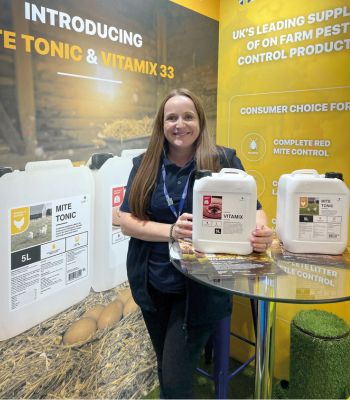
Olivia Young, marketing managing at Lodi UK said attending the Fair is not about the hard sell, but the chance to give technical advice, answer questions on pest control, and educate farmers on the correct use of Lodi’s products.
Visitors’ main concerns were red mites, flies, litter beetles and rats, all of which Lodi has a solution for. Mite Tonic and VitaMix 33 are two newly launched products, which have been tested and approved by a cohort of farmers.
“Both are complementary liquid feeds, designed to be added to poultry drinking water.
“Mite Tonic is a nutritional supplement, which contributes to improving the natural resistance of chickens in their environment, while VitaMix is a balanced combination of water-soluble and lipid-soluble vitamins, amino acids and minerals. Naturally derived additions to animals’ diets ultimately helping to promote healthy livestock.”
Lodi was also showcasing its award-winning Anti Rodent Sealant that works to prevent rats entering feed stores or livestock pens.
Additionally, Anti Rodent Spray is popular with farmers as it deters rats from chewing wires on farm machinery and tech equipment. Not to mention its customer choice range of Lodi’s Gems rodent control baits.
Ministerial visit
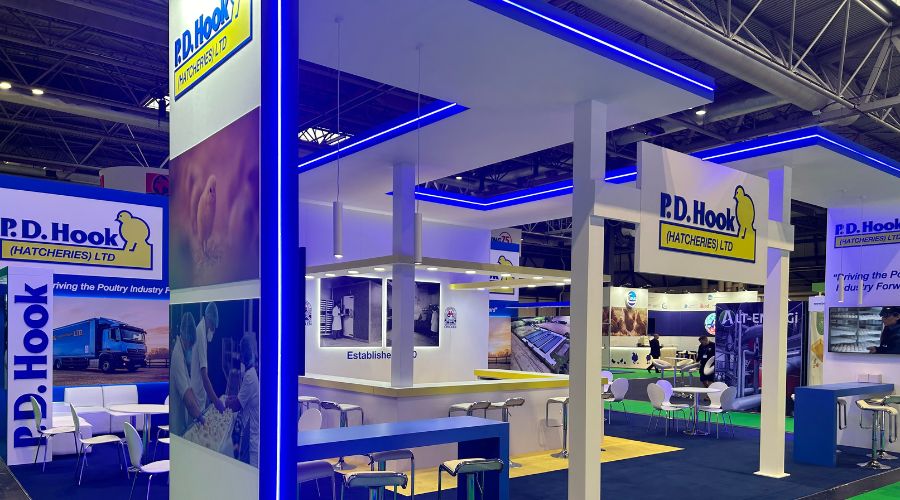
P.D. Hook (Hatcheries) had two very busy days on its stand at the Fair this year – and it provided an opportunity to catch up with its customers, growers, retailers and its own farming teams across the UK.
Farming minister Mark Spencer paid the stand a visit, giving the company an opportunity to highlight key challenges facing the industry. For example, fairness in the supply chain, access to labour and a more pragmatic approach to planning.
It has been a difficult two years for the poultry meat industry with farmers struggling to recover the cost of inflation, whilst retailers make record profits. The good news is that demand for British chicken remains strong and with welfare, food safety and security at the top of the agenda, P.D. Hook says the UK poultry meat industry is well placed for the future.
Bears and knight battle disease

Two teddy bears cuddling a piglet is the iconic image at the heart of Zoetis’ new campaign to promote Circomax, a PVC2 vaccine. The teddy bears signify the two genotypes contained in the CircoMax and CircoMax Myco, and the stand certainly caught the attention of visitors.
Product manager Amy Roger said: “It is the only PVC vaccine on the market that contains two genotypes, providing a far broader protection than vaccines with a single genotype. […]
“On the chicken side it is all about the strength of the Poulvac E. coli vaccine and for that we are using a medieval knight in full armour. On a serious note, this is the only live vaccine on the market and could play a big role in strengthening broiler or layer flocks and reduce antibiotic use.”
Boosting lifetime performance
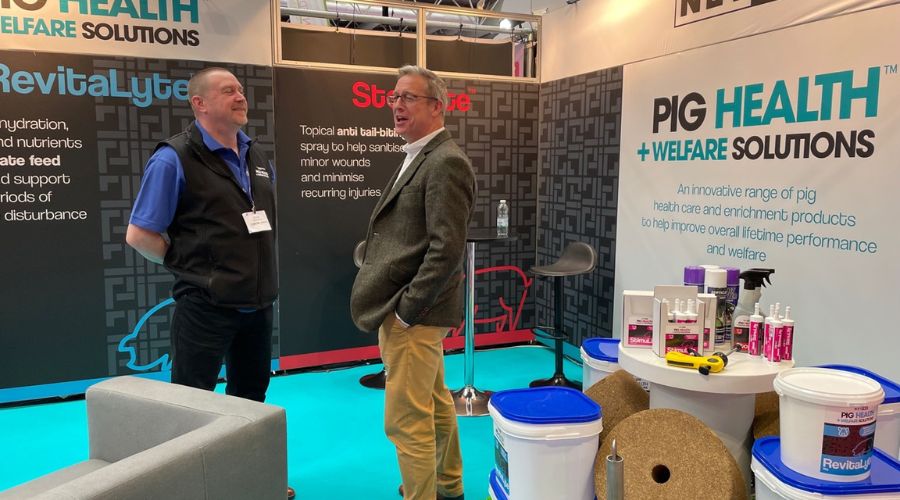
Nettex Pig Health and Welfare Solutions provides an innovative range of pig health care and enrichment products to help improve overall lifetime performance targeting key stages in the production cycle.
Nettex StimuLife has been shown to improve piglet survival and performance rates by up to 33% by helping to support the piglets’ natural defences at birth and pre/post weaning.
StimuLife provides piglets with a highly digestible source of energy, high levels of vitamin E and probiotics to help support them through periods of stress and to help stimulate proliferation of beneficial gut bacteria.
The removal of zinc oxide from piglet diets adds further complication, as alternative methods to control scours and diarrhoea are needed.
Nettex RevitaLyte’s ingredients help maintain osmotic balance and water retention, prebiotics help to support the gut microbiome, maintaining good digestive function and helping to reduce digestive disturbances.
Calm Block is a specialist pressed feed block which offers stimulating environmental enrichment as a nutritional solution to help reduce the incidence of aggression and vice behaviours in pigs.
Calm Block has been demonstrated to encourage instinctive pig behaviours, including chewing, rooting and investigating, satisfying the pig’s natural curiosity and is a convenient solution to help relieve stress.
Benefits of shared knowledge
Free-flowing, clean water is key to good animal health and welfare, productivity and reducing medication and antibiotic use. This means finding an effective method to kill bacteria in water sources. Doing just that is International Water Solutions (IWS), the brainchild of founder Al Sayed.

Embracing cross-sector solutions is one of the keys to the company’s success in using patented formulas to kill bacteria in water sources.
“We bring in technology from other industries we work in such as food production or the NHS,” Al explains. “These sectors work to very high standards of biosecurity and auditability, so we are able to bring those same standards and technologies to the farming community at very little cost. Farmers can benefit from shared knowledge.
“Clean water means greater productivity, better health and less use of medication and antibiotics.”
The company also has huge focus on recycling wastewater by removing contaminates including phosphates and nitrates. An innovative chemical-free unit purifies the wastewater, which is then either re-used or discharged safely within consent levels.
“It just makes sense to re-use wastewater,” Al continues. “Why would you pay to treat water and then just throw it away?”
Walking on (strong) eggshells
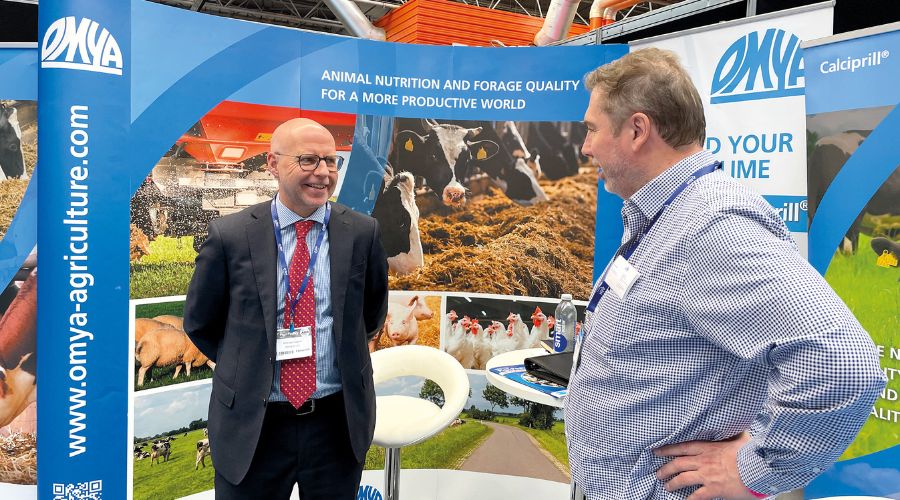
The availability of sufficient calcium during eggshell production is essential to maintain shell thickness and overall health, reducing losses through breakage.
So ensuring laying hens have an easily accessible source of this essential mineral is key. When it comes to feed, particle size and solubility are key considerations.
Omya Avicarb is highly soluble and digestible. The particles remain in the gizzard during non-feeding periods, contributing to the slow release of calcium during laying.
A quick fix

Collinson Silos offers UK-built silos from 4–35 tonnes for all different feed types and its FeedAlert app monitors the feed levels in the silo. Offering 95% accuracy, it helps producers stay on top of re-ordering and ensures a steady feed supply.
Sally Hayton explained that you don’t need a new silo, it can be easily retrofitted to the leg of the silo – and importantly, this can be done by the farmer. “It also reduces waste and over-ordering. The price of the installation is quickly recouped by far greater efficiency.”
British built is winning factor
Hydor, the ventilation arm of EG Agriculture, was showcasing its round chimney at the Fair.
“Traditionally we have always had square chimneys but when we were accused of being ‘old fashioned’ we decided it was time for a change,” said Harry Atkinson, technical sales.
Despite the market for equipment such as this contracting, Hydor is more than holding its own. Mr Atkinson puts this down to the fact that everything is British-manufactured at the Hydor factory in Salisbury and is custom made.
The biggest change to the sector is the increase in size of broilers. Mr Atkinson explains: “Because they [broilers] are going to 30kg, there is a demand for new sheds but they don’t need so much ventilation so we are actually down-sizing the specification on what was produced before.”

Keeping the best of the outdoors indoors
It was happy 40th birthday to the team at Galebreaker as the family firm celebrated four decades of creating weather shields and protection for livestock.
Galebreaker products are integral to many farms’ high welfare status as the weather shields create a comfortable, well-ventilated environment for the livestock.
“Our motto is: we try to keep the best of outdoors indoors,” said Will Johnson, Galebreaker’s UK and Ireland agri sales manager.
“A lot of the narrative in our sales process used to be about keeping bad weather out of the building.
“That aim hasn’t changed but now the message is about trying to making happier, healthier and stress-free animals, which fits in very well with today’s narrative around the Animal Health and Welfare Pathways.”

Vaccination made easy
Animal health company Ceva launched its EASI swine injector at the Pig and Poultry Fair.
“This is a smart, open treatment device which provides accurate vaccinations and controlled dosing on the farm,” said Natasha Lovette, junior product manager.
“It is quick and simple to use, which improves animal welfare and the accuracy of the dosing means a reduction in any over or under dosing, which is, of course, crucial to the bottom line.
“We are also demonstrating the very beneficial Ceva lung programme, which really demonstrates the importance of healthy lungs on overall performance.”
Doing better with chemicals
Evans Vanodine is celebrating its 105th year, and it’s a true family firm; currently eight family members are involved in the company.

It is also a company that has its eye on the future. While there are members of staff who have been with Evans Vanodine for more than 30 years, the development labs are full of young talented scientists and technicians who are driving the company forwards.
“We develop, formulate, manufacture and distribute animal disinfectants, trying to improve the health of the livestock. It is a question of reducing the costs – of ill-health, vets bills and medication – at all points of the supply chain,” said Nick Evans, UK and Europe animal health manager.
“We are unusual in that we are a chemical company trying to reduce the use of chemicals. It is all very science-led.
“Our next mission is to bring new products to the market. We want to be, and remain, at the forefront of UK agri development.”
Read more livestock news







